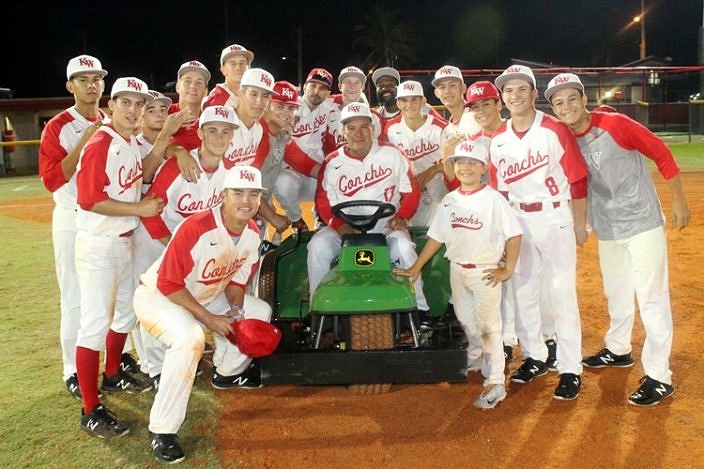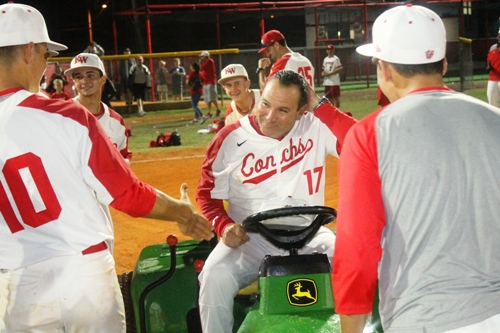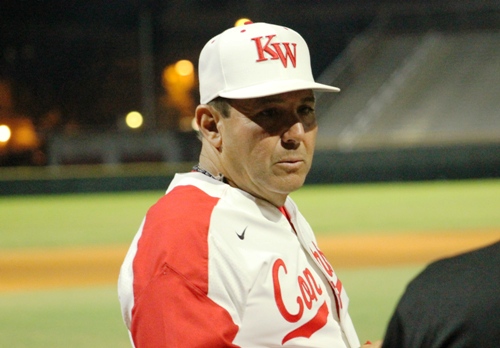Sunday Morning Chat: Key West Manager Ralph Henriquez

Key West Manager Ralph Henriquez has his Conchs playing good ball and back in the mix for a state title. The manager, who has Key West at the top of the 5A-16 standings, recently sat down with HSBN’s Anthony Uttariello to talk about his 300th win, his coming-of-age team and the island that lives and breathes for Conch baseball. Enjoy!
Anthony: Alright, let’s start in a memorable way. You recently won your 300th game against Mater Lakes Academy. It was a back and forth affair. Talk a little bit about that great milestone.
Coach Henriquez: Well Anthony, you know, for a while there you don’t even think about that one. You know that because, already with Rick Lopez our radio announcer that cover us and “Hey, you’re one game away from the 300 game.” And he asked me to talk about it, and I did, on a radio show. But when you get into the game, you’re more on to playing good baseball and seeing things that you worked on during the week to come to fruition on the field.
And when we got down 4-0 against a very good Mater Lakes team, I said “Well, you know what, things we worked on are not fairing very well but let’s see if we can get back on track.” Then when these kids came back 5-4, I had a couple of kids come up to me and tell me “Coach, we’re gonna get this one tonight.” And I said, “Oh, ok…” and I didn’t think they knew anything. But, it’s just, you know, an accumulation of playing very hard, doing what we do, executing what we work on all week and just thinking about what we do. But to win 300 games in a program like this is just very special.
Anthony: I’ve been down here each year for the past four or five years but this year I kind of got a different vibe. It feels like the players and the community understands that this particular team has a chance to be great. Do you feel that’s the case?
Coach Henriquez: I do. These kids have come so far in the fall. This fall, we’ve seen guys go from 82, 83 miles-an-hour to 89, 91 to 92. We’ve seen guys understand the fundamentals of hitting and staying back on balls and using the other side of the field. We’ve seen kids start believing in their abilities because we’ve had different college programs call us and come visit us and want to see how we do things. And of course, this group of kids here, there’s a nucleus of them that have been around me since they were 12 years old. And they know what I taught them when they were 12 on how to play baseball a certain way, which is really the Braves way, which goes back to when I was in player development with Atlanta.
Now, all of those fundamentals, all of those ways of understanding of how the game should be played, now these guys are, you know, Antonio Knowles, Will Anderson, these guys are now 18 years old, so they’ve been hearing that for years and now you kinda of start to see it all come together. You know, the way we play, the way these guys know what winning baseball is, we go out there, we play against teams that are bigger, maybe a little more ability than us, but we find a way to play you pretty hard.
Anthony: You are now in the later stages of your coaching career. Tell me some of the things you do differently these days that you did when you were a young coach.
Coach Henriquez: Oh my. You have to change. When I first started, I would say on a scale of being hard, 1-5, I would call me a 7. Now, I think on a scale of 1-5 I’m probably a 4. Because you, know, players are different and when you’ve been coaching. . . I mean, I’ve won 300 games here, but I’ve won 100, I don’t know, games managing in the minor leagues, and won games the one year I was at Belen. You know, so I’ve been around baseball for quite awhile. No matter if you’re a head coach or hitting instructor, catching instructor, if you’ve been around baseball, players are different today than what they were many years ago. The way you communicate with them today is different.
Social media coaching comes in with these kids. I think you have to be more aware of what you do as a person and as a coach and you always want to improve as a coach and be a professional about how you go about things. But I think the way I handle players today is more an open communication style than previously. Because, it’s all about the players, it’s not about the coaches, it’s not about a parent. Because I really, the parent part, I really phase out immediately.
It’s just the focus with the kids. I make the kids communicate. I don’t want a parent calling me and telling me “My kid isn’t coming to practice today.” The best combination that gives us the best chance to win, that’s who’s going to play here. There’s no, well this kid this, and this kid that. No, you work hard, you play and at the end of the day your players make the lineup. Kids know who can play and who can’t play! Kids know who can pitch and who can’t pitch. And you have to be a communicator with these kids, they’ve got to know the truth. And that’s what I do with them. But it’s definitely a different era.
At the end of the day Anthony, the game hasn’t changed. Baseball is still baseball. Kids have changed and you know, I’m still pretty relatively old fashioned in the way I do things but you know, the game is still the game, and I know there is a lot of changes in the game going on, but at the end of the day, it’s still baseball.
Anthony: Something you just hit on I would ike to expand. What perspective do you think that coaches gain as they age, because to a man, when I do these interviews and I ask the older coaches, they’re saying they’re not as intense and the way they communicate with players is different. So, what do you think happens in your later stages of a career That your perspective kind of changes as a coach.
Coach Henriquez: Well, I think one of the things that change, and this is just my opinion, with coaches as they get older, they kind of mellow a little bit. I have students that come to me, I teach Business Life Skills at the High School and my students will say in class to me, you know, ‘Coach is different in the classroom, than on the baseball field, he’s a different person’.
I tell the kids, I’m not really a different person, it’s just, I’m more in my element. It’s win or lose; it’s being competitive. And I think sometimes, when coaches get a little bit older they kind of lose the perspective and the edge of how important it is for them still to win. And I see that in a lot of coaches at all levels. Professional baseball, college and in high school.
And Rick Lopez, who covers our team asked me, ‘Ralph, how much longer are you going to keep coaching?’ And he says, ‘Between your pro career, and your high school, you’ve got to be somewhere around 500 wins.’ And I said ‘Yeah, probably pretty close.’ But I told Rick, I said, ‘Rick, as long as I’m still productive, I can still make players better, I can still help kids get better and go to college and when I lose a high school game and it bothers me, for two or three weeks, that is when I know I still have the fire to coach.’
And I think a lot of people still continue to coach and they probably shouldn’t because they’re afraid to step away from it. I’m not afraid to step away from it because if I’m not productive, I don’t deserve to be here coaching, it’s time for somebody else. And as long as we can do that, it’s good. I just think a lot of coaches don’t know when to stop, and when you can be comfortable with kids not playing well, be comfortable with losing, and accept it, I think that’s when you need to get out.

Anthony: If you could go back through your coaching career and change one thing about your coaching career, make one different decision than what you made at the time, what would it be?
Coach Henriquez: Well, I think, if I had to make one decision, probably in 1994 [laughing], see how far I could go back [laughing]. 1994 was my first year here, we made a dramatic turnaround in Conch baseball. I came here when I was hired in ’94. I was hired by a committee that interviewed me and I told these people that, you know, that they wanted the program to go to a new level when I interviewed for the job in ’94.
And I said that I had, with the players that I knew in the program, the history in the program, which at the time we only had I think seven state championships at that time; and I said, you know what, I’ve got a five-year plan I’d like to execute here and be able to do things and bring this program to national levels. Well, thank God I did it in two.
But in 1994 we took the team to the final four, we were state runner-up. We won the first ballgame and then the second ballgame we lost a very crazy game that when I look at that, I had a Sophomore pitcher that I probably should have brought in and I didn’t, I went with an older Senior guy that hadn’t pitched as much as this 10th grader did during the regular season and the only reason I didn’t bring him in was because I have always been fond of having an older team. And I always thought with older players, you could win.
If I would have put that young guy in, I still think that we could have won. We ended up losing 8-7 in the game we should have… if we played that team 10 times, we beat them nine. But that one day, we didn’t, and it cost us the State Championship.
Anthony: So transitioning, obviously the whole experience of High School baseball down here in Key West is different than any other place. But what’s the one thing you guys do differently that you take the most pride in?
Coach Henriquez: Well, I think the most pride I take in, is what Conch baseball means to this community. There’s a lot of proud people here in Key West, you know, and that’s why we’re Conchs. We take tremendous pride in Conch baseball. We have 11 state championships here. A lot of them were in the ‘50s, one in the ‘80s, we ran a bunch of them in the ‘90s and then the last one was in 2005. And, we’re a very small community. What we have here, what we work with, what we develop. We just work very hard. We take a lot of pride. Our community is very supportive.
Our infield, this field here at Rex Weech Field here, has been in very bad shape for a lot of years and we had a group of parents that came and said “Coach, we want to tear that infield up and we want to put a new one in, and we’re paying for it.” The school system didn’t pay for it and these parents came up and you know, spent $27,000 of their own personal money. They hired a group of people from JetBlue in Fort Myers, from the Boston Red Sox, who came and stayed a week at the DoubleTree and they were out here for the summer, and put in a brand-new infield.
That’s why, when you have people that have that kind of a commitment to Conch Baseball, you know, I can’t feel as a coach that this is not important. I can’t feel that this is just another game. If you win you win, if you lose, you lose. That’s not the mindset here. And this is what we teach these kids about, the history of a small little island like we are, what players we get that come from the youth leagues, that’s what we develop, that’s what we teach. And we’ll run here, tonight we play against a very talented team and we’ll have three freshmen in the lineup that aren’t even 15 years of age tonight and they will compete against a very talented team. But they know what the expectations are and we challenge them to do that.
And that starts with me as a head coach and goes down to my coaching staff who all played for me, all have been on state championship teams here and they know what it takes and they get very upset when we don’t execute or don’t do things because of the times that they’ve put in with these players, and they know what it takes to win. This is what Conch Baseball is about. This is what this island’s identity is, is Conch Baseball, and that’s what we have here today.

Anthony: If you weren’t coaching baseball these days, what would you be doing?
Coach Henriquez: [chuckle] Well, if I wasn’t coaching anymore, which one day that is going to happen, I’ll turn to running our business. You know, we’re in the mobile home business. Along with baseball, coaching and teaching, taking care of my family, we run a mobile home park and we’re on the verge of scaling our business and continue to purchase parks, as our goal. And scaling and even buying some parks, in a lot of Key West and Central Florida. So eventually, one of these days I’ll go from the diamond to [laughing] to the mobile home park. The mobile home park scene.
Anthony: When the time comes, you talked before about when the time was for you to get out, but when that time comes, and you have to pass the torch to the next Key West Manager, what your words of advice be for him to handle all that this particular job entails?
Coach Henriquez: I’ve been very blessed to have very, very supportive people. You know, the radio station with Rick Lopez, Jack Niles, my wife, and I have a lot of parents of former players of mine that come and volunteer. I have many parents of alumni that will come out and run the grill for us, because they love it. That person that’s going to have to come here to replace me, which we all are replaceable, they’re going to need to be able to put together a team of people like that to continue running this, because you know like I’ve mentioned to you years back, this program, to do what we do, fly out of Florida and go play out of the state and do this and do what we do here, you’re looking at about a 90 to 100 thousand dollar budget. And that comes through the gate, the concession stands, because we don’t receive any assistance from the school district and nobody does, for that matter.
So that money comes from us generating sales in the gate, the concession, the business community donating, golf tournaments. It’s massive work. And then, you still have to have that in place, and those skills to do that and keep that organized and have people, because you can’t have your hands in on everything. So you have to have great people and thank God I have great people to do that.
But then you’ve got to have the baseball players. Because that could be great over here, but then, if this over here fails, you’re not going to have the support through that gate, because people in this town expect quality baseball and that’s why we have what we have. So, you know, that next person is going to have to understand the dynamics of Conch Baseball and what it takes to win here and you have to, these players have to believe in that person. It’s a lot about tradition and that person will have to say ‘this is going to become a big part of my life.’
Anthony: Lets finish with a little fun question and answer segment. I’ll give you a couple of choices, you give me the answers to each one. First one is, Football or Basketball?
Coach Henriquez: Haha…Basketball.
Anthony: Golf or the beach?
Coach Henriquez: The beach!
Anthony: Ice cream or candy?
Coach Henriquez: oh, ice cream.
Anthony: Wings or pizza?
Coach Henriquez: Depends on where they’re from.
Anthony: Horror or comedy?
Coach Henriquez: Comedy, definitely comedy.
Anthony: Country or Rock N’ Roll?
Coach Henriquez: Oh, country.
Anthony: Alright, last one, a walk-off home run, or a walk-off squeeze?
Coach Henriquez: Walk off squeeze.
Anthony: Why?
Coach Henriquez: It’s exciting! Home runs are pretty, but squeezes, they’re exciting.
Anthony: Alright, thank you again for everything you do here for Key West and the high school baseball community.
Coach Henriquez: You’re welcome, Anthony. Thank you for coming down.









